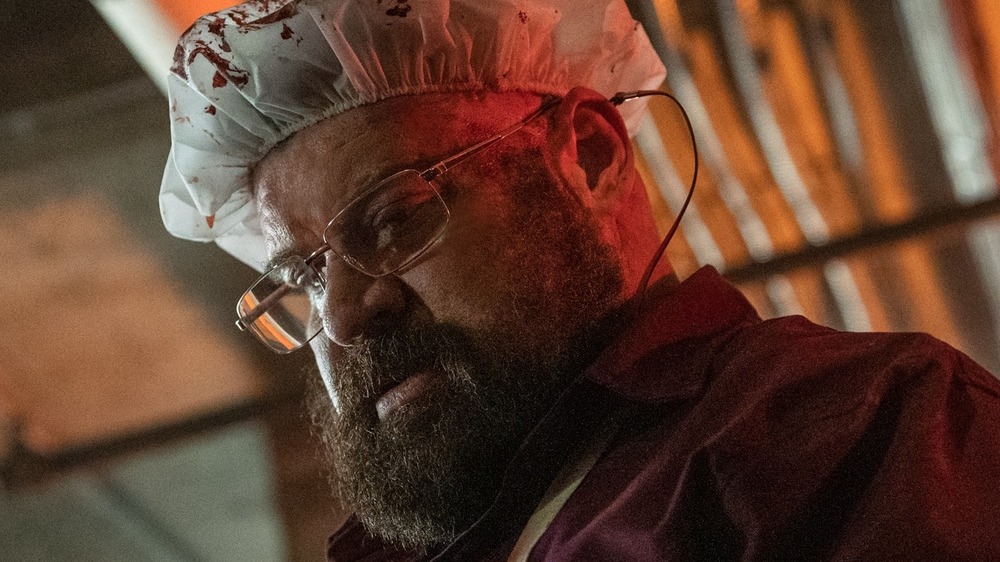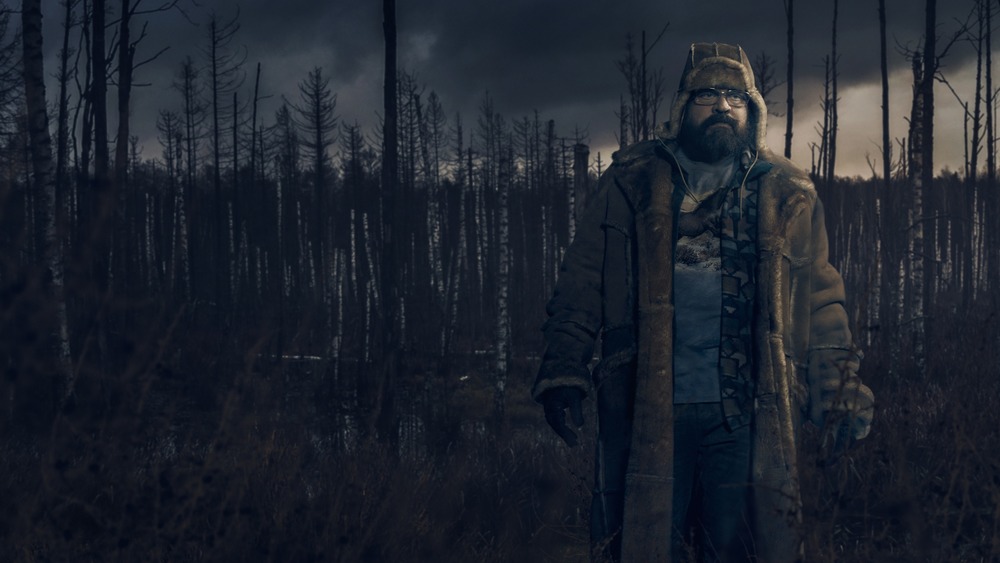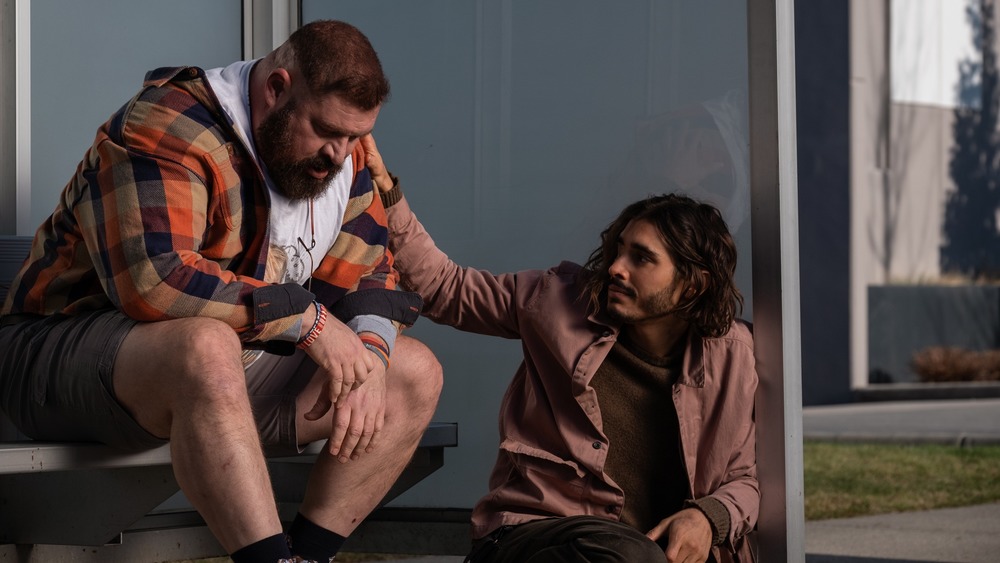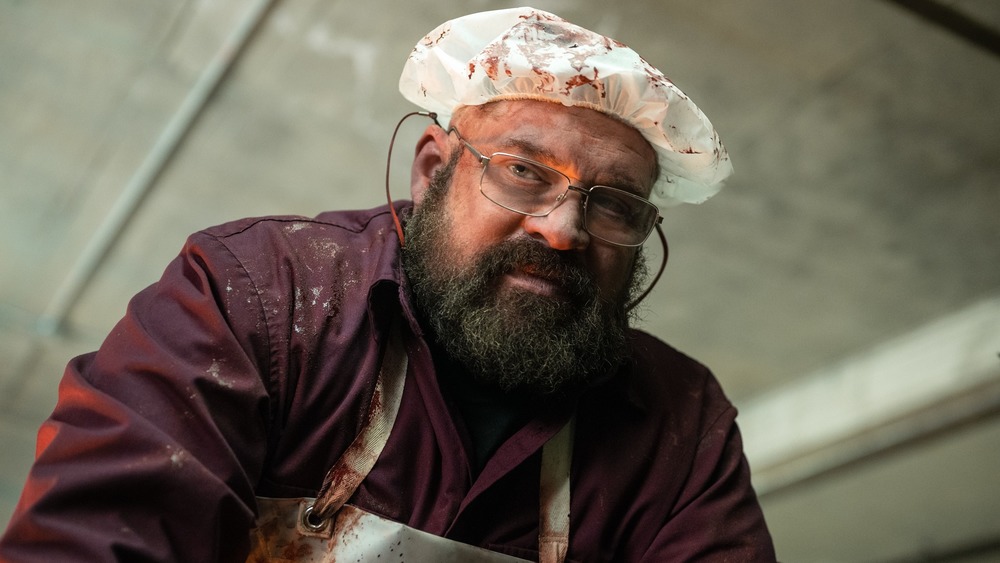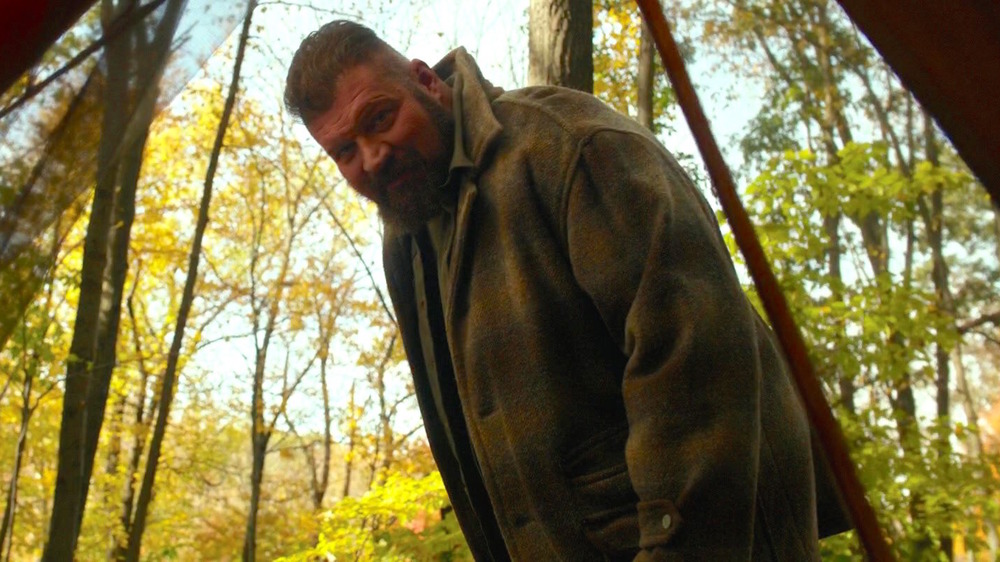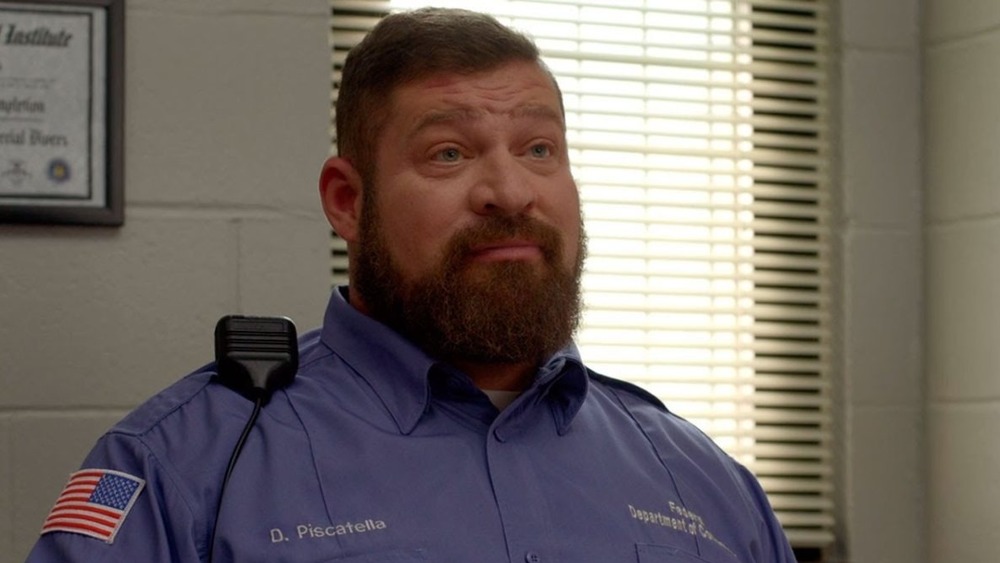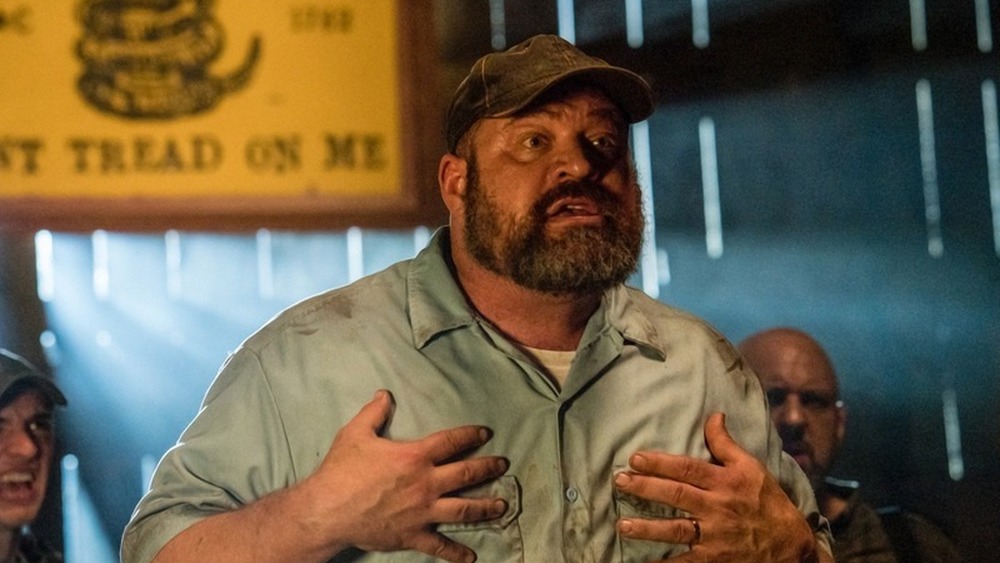Brad William Henke On The Stand And More - Exclusive Interview
Changing careers can be a difficult thing at the best of times. But that's exactly what Brad William Henke did in 1994, two years after his short pro football stint — which included a run with the Denver Broncos that yielded both a string of surgeries and a Super Bowl appearance — came to an abrupt end. Tipped off by a fellow ex-player, he tried out for commercials that were looking for actors to play football players — and was instantly hooked.
More than 25 years later, Henke hasn't stopped working, moving from bit parts to supporting appearances to featured roles. Among his movie credits are World Trade Center, North Country, Pacific Rim, Draft Day, Fury, Split and Bright, while his TV resume includes guest and recurring roles on Dexter, Law and Order, Lost, Justified, Longmire, Manhunt: Deadly Games and a breakout role as the sadistic yet tormented prison guard Desi Piscatella on Orange Is the New Black.
Henke also appears in CBS All Access' limited series adaptation of Stephen King's The Stand. He plays the good-natured, kind, and developmentally disabled Tom Cullen in the epic post-apocalyptic tale, in which a pandemic wipes out most of humanity, leaving two groups — one "good" and one "evil" — to battle for survival. The show's series finale airs on Thursday, Feb. 11.
While Tom in the book and the 1994 ABC miniseries (where he was played by Bill Fingerbakke) is conceived more as a gentle, soft-spoken child in the body of a man, the new series' Tom is still challenged by his disabilities, but has been reconfigured to fit into a more modern understanding of the disabled. That made Henke more comfortable about taking the role, as he tells Looper in this exclusive interview about The Stand, his career, and more.
How he got the role in The Stand
Were you a fan of the book The Stand or a Stephen King fan in general?
I was a King fan, but I had never read The Stand and I didn't see the (original) miniseries. Ben Cavell, one of the executive producers/showrunners, he wrote on Justified, which I was on, and Sneaky Pete. He called and offered me the job. He just thought I was who he wanted to play the role, so that's how it happened with me. So I actually read the scripts first and then I read the book.
Tom is very different in this version of the story than he was portrayed in the book and in the 1994 miniseries. How important was it for you to take the essence of the character and update him according to what we know about developmental disabilities in 2020?
I didn't want to play a one-dimensional character or a caricature or anything like that. Fortunately for me, in the first script I read, it said that he'd had a head injury, that's what that scar was, and I felt... How do I say it? If he was born that way, then I think I wouldn't have probably wanted to play the character, just because I'd rather give someone else a chance. You know what I mean? I would just feel like it was a weird situation, so the fact he was injured gave me permission, I thought.
How Brad researched his part in The Stand
What research did you do on your own for the part?
Well, I did research, but I've also... When I was a football coach at this junior college, I had a weightlifting class and the special needs students would come in there in the morning. There was a kid, Tom Evans, who I ended up making a manager of the football team, kind of like that movie Radio, so I was very close to him.
Also, when I was in high school, a kid that was couple of years older than me went to the University of Colorado to play football. His name was Ed Reinhardt Jr. He had a blood clot in his brain that broke, and ever since then, he was not himself. He said to me once, "In here, I'm still me," which made me feel like... that's got to be very frustrating. Do you know what I mean? That's got to just pull on your self-esteem. I just tried to put a lot of these feelings — which weren't written — in there, and just carry them with me, with Tom.
Is that something you had seen from your days in football, the long-term effects of CTE (Chronic Traumatic Encephalopathy) or head trauma in a lot of those guys?
The only one was Ed, and that happened, I think, his sophomore or junior year of college. I don't really know anyone personally that has CTE, and I don't feel like I do, but I know it's a possibility, always.
Look, I don't know a lot about CTE, but I do know that if you play football, rugby, boxing, martial arts, you're going to injure your brain. People hurt their ankles all the time and they're fine. I hurt my ankle really bad in college and there hasn't been one day since that it hasn't hurt me. Some people respond to things differently... That's kind of how I look at it. I think if I personally had any effects, I would have them by now.
Why Tom Cullen is a challenging character
You mentioned earlier that Tom having the head injury in his past gave you permission to play the character. There was some criticism about Henry Zaga, a non-deaf actor, playing the Nick Andros character, who's deaf. On one hand, actors are supposed to act and take on roles that are not like them in real life, but there's a legitimate argument for casting actors from those communities.
That's exactly how I feel too. My ex-manager had a client who played the main gangbanger in Training Day. He's Maori from New Zealand, but he can play every ethnicity. You know what I mean? He can do all the dialects and the accents. It's amazing, and, as an actor, that's what you want to do. But then, if you're an actor with a disability, you want your chance to play those characters too. I feel like everyone should have a chance, and then they should choose the one who brings it to the screen the best.
Did you see the performance in the '94 miniseries by Bill Fagerbakke?
No, I didn't, just because I didn't want to be influenced one way or the other. I didn't want anything in my head. It's like, "Try not to think of the number two." You're going to think of the number two. You know what I mean? So I just tried to do my own thing.
Filming the end of the world
Was it eerie to finish filming this literally as a real-life pandemic was just starting to happen?
Yeah. I had to fly back to shoot... the last thing I shot was the scene where I drove away on my bike. That's the last thing I physically shot in the series. So I drove my truck and my dogs home to L.A. from Vancouver, and then I just flew back to do that one scene. When I landed in customs, which usually takes you like three hours to get through, there was no one there. I was like, "Oh, no." I went to a hotel, there was like five people in this huge waterfront hotel.
If it was the end of the world, and you had to leave your home and you had to resettle somewhere else, what would you take with you?
My dogs. That's it. And my bike. I love my bike as much as Tom loves his.
How Orange is the New Black changed Brad's life
Is there one show that people stop and ask you about the most? What do you think you get the most recognition for these days?
Orange Is the New Black, by far. My whole life, after a while, I feel like I was respected as an actor... you know, in L.A., it would be like, "Oh, I saw you in this Sundance movie," or this or that. Then in New York you would get more like — they saw you on one episode of Law and Order or something. But when Orange came out, I was in New York shooting my second season of Orange, and literally every 10 feet someone was stopping me and taking a picture. It was a whole culture shock.
You recently starred in Manhunt: Deadly Games. What was that experience like?
Michael Dinner, who was the main director, was also the main director on Justified, so that's how that came about. A lot of people have been coming up to me about that lately because it was on Spectrum and then CBS, but now it's on Netflix. This guy came up to me the other day and he's like, "Hey. Do I know you, man?" and I'm like, "No, I don't think so." He's like, "Yeah. You were in that militia," and I was like, "No." He's like, "Yeah." I thought he was really thinking I was a dude in a militia. He's like, "No, I saw you on TV..." I didn't realize it was on Netflix or whatever.
That dog that led our charge on that show was a Doberman that made me want to get a Doberman because it was so sweet. Some of the younger actors that I worked with that were in the militia were great kids and just really serious about acting. Nick (Searcy) played the sheriff, and Nick and I used to have the same manager who just passed away last year, Jill Rice. I just knew a lot of people there, so it was really nice.
Brad loves acting and has never looked back
If you could put together your own dream project, what would it look like and who would you want in the cast and crew?
That's so hard to say because there's so many people, and I am trying to get a show made. I really just want to get a show made that is to me what The Sopranos was to James Gandolfini. Something that will be able to showcase me and push me and let people see what I can really do over a long period of time. I love working. I love working 15 hours and having to get back up the next day at 4:00 AM. I love finding time to rehearse. I love acting, so I want to be challenged and super tired and do something that effects some type of positive change.
When you moved from football to acting, was there a role that you got that made you feel like, "This was the right decision"?
I booked the first commercial I ever went out for. It was for Hungry Hunter restaurants. I booked this thing and I shot it and it took half a day. I thought, "Oh, that's easy." But when I was walking in, I saw this older man that I had seen at the callback, so I guess they had hired us both in case I crashed and burned. I was so oblivious.
My first three auditions, I booked for films. Space Jam, where I played the catcher when Michael Jordan's at bat; The Fan, which was a baseball movie with Wesley Snipes and Benicio del Toro — I think I ended up with one line in that movie; then a movie called Mr. Wrong, an Ellen DeGeneres movie where I played Joan Cusack's boyfriend. Those were my first three auditions, so I thought that was the universe telling me, "This is what you should be doing."
The series finale of The Stand streams Thursday, Feb.11, on CBS All Access.
